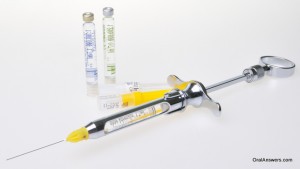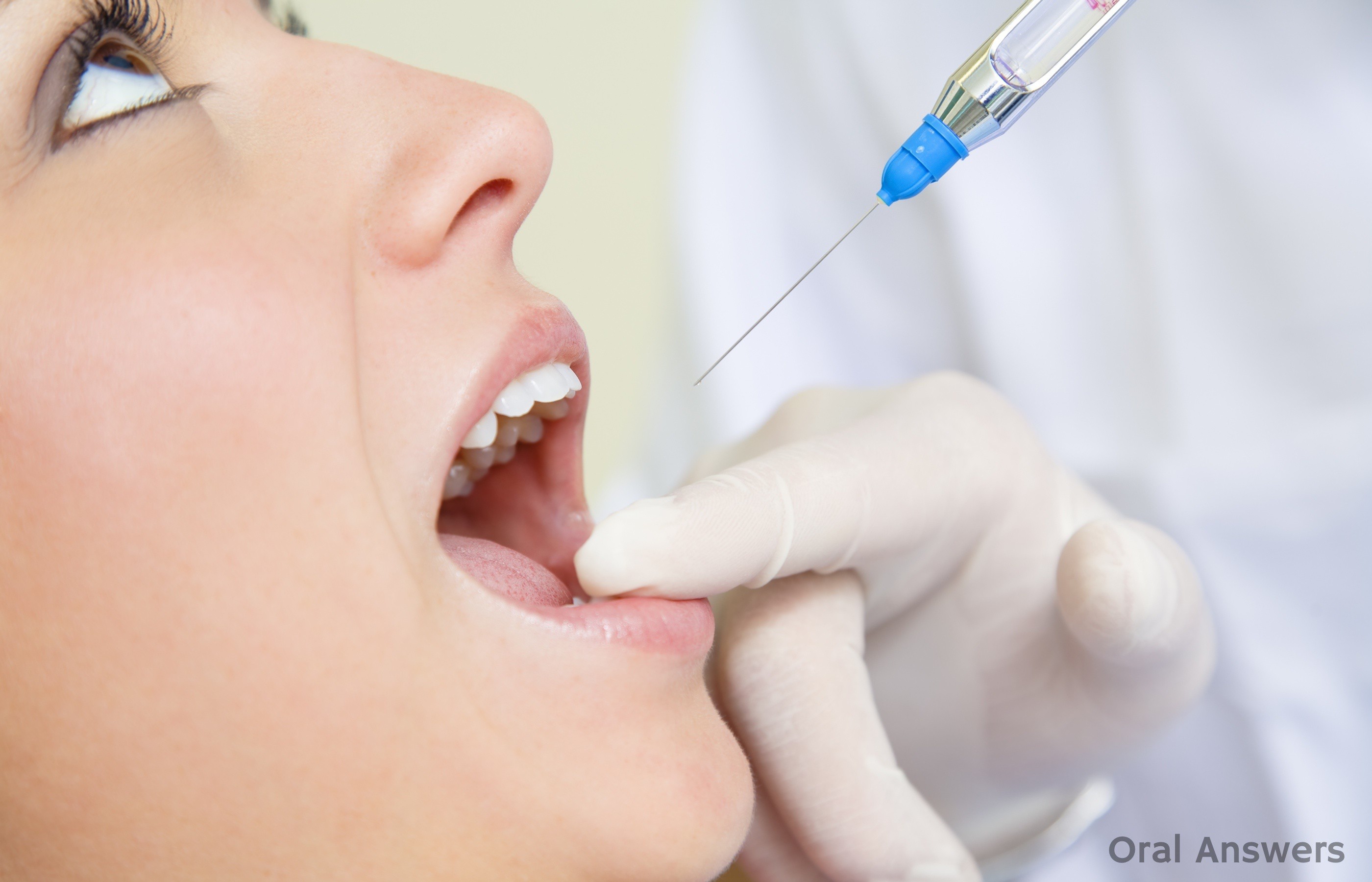When you get a dental injection, your body wonders why on earth you’re allowing a sharp metal object to penetrate your gums! It quickly tries to repair the damage by increasing blood flow to the area so it can carry away the anesthetic, which it views as a foreign substance. As you might have guessed, if your body’s protective response tries to get rid of all of the anesthetic, it’s not going to last very long.

This was a big problem with anesthetics back over 100 years ago. Then, something exciting (to dentists anyway) happened! A guy named Abel discovered adrenalin (a more common name for epinephrine) in 1897. In 1903 Braun suggested using adrenalin as a “chemical tourniquet” to make anesthetics last for a longer period of time.
This Braun fellow recommended using epinephrine at the very small concentration of 1 part to 10,000. That may seem weak, but we’ve found that even diluting it to 1 part to 200,000 still retains the beneficial effects of epinephrine while minimizing the side effects.
Epinephrine is what is known as a vasoconstrictor, which is just a fancy word for something that causes your blood vessels to constrict, or get smaller.
Why Dental Anesthetic Has Epinephrine
It is this vasoconstrictor effect of epinephrine that makes it so useful in dental anesthetic. By constricting your blood vessels, it benefits you and your dentist in the following three ways.
1 – The anesthetic gets absorbed more slowly into your body because blood flow to the injection site is decreased. Since blood levels of the local anesthetic are decreased, the risk of having an “overdose” of the dental anesthetic is minimized.
2 – Since there is less blood flow, the dental anesthetic stays put right around the nerve for a much longer time, allowing it to work for a longer period of time than it would without epinephrine. This means that you stay comfortable throughout the entire procedure. It also means that you might be numb for a few hours after leaving the dentist – a sometimes unwanted and embarrassing side effect!
3 – Minimizes bleeding where the anesthetic was administered. This is great if the dentist is performing a more involved surgical procedure involving the gum tissue since it makes it much easier to see what we’re doing if there’s hardly any bleeding.
Epinephrine is the most common vasoconstrictor used in dental anesthetic in the United States. In Europe, a vasoconstrictor called levonordefrine is commonly used.
If you prefer to not have these beneficial effects of epinephrine or if you have had heart problems, your dentist may elect to use a dental anesthetic without epinephrine. If that’s your preference and you want to seem like you know what you’re talking about, just ask your dentist for Carbocaine without epinephrine. That’s the most common brand name of dental anesthetic without any epinephrine.
If you have any questions about dental anesthetic and epinephrine, feel free to leave a comment below. Thanks for reading!

It’s always important to talk to your dentist before you get any kind of anesthetic just to be on the safe side. Certain medications and anesthesia don’t play well together and you don’t want any complications!
There are also patients that are highly allergic to bisulfites which happen to be the ingredient that is used to preserve local anesthetic to make its shelf life longer. For those patients a special vial of anesthetic of preservative free anesthetic can be obtained from the pharmacy to be used as an injection for restorative work.
My son just had regular dental filling yesterday and seemed fine all day. At 5:00am this morning he woke up to chills, nausea and strong headache. Gave him Tylenol and 2 Tums, took about an hour until he fell asleep again. Still has chills now, not as strong as middle of night. Called his dentist but he’s never had any reaction to dental procedure before.
Making an appt with his PCP to get him checked out just to be sure. He is 19.
Have you had any patients with similar symptoms after fillings done?
He is no medication allergies. He does us pre and post workout supplements but didn’t have any the day of dental fillings. Any feedback would be appreciated.
Thanks!
-Concerned mom
do patients who have wpw have a problem with dental anesthesia . / or how about those with atrial fib . Is regular novacaine okay?
Is nitrous oxide a safe option for someone wih an arrhythmia ,wpw or atrial fib for a nesthetic instead of novacaine?
If you are prone to blisters, then taping your feet in troublesome areas
with zinc oxide tape is advisable. Some parts of exercise gear
claim to work all of your sinew assemblies, but this is
not simply possible. Body mass Index is a Nokia fitness calculator app that lets you calculate, as the title suggests, your body mass index (BMI).
Is nitrous oxide a protected alternative for somebody wih an arrhythmia ,wpw or atrial lie for a nesthetic rather than novacaine ? He is no solution sensitivities. He does us pre and post workout supplements yet didn’t have any the day of dental fillings. Any input would be welcomed.
My dentist was pulling my upper left moler and slipped and one part of the root broke off and went into my sinus. He stopped working for a min called an oral surgeon friend cause he said he needed help and was advised to remove what was left of the tooth and then referred me to the surgeon to evaluate my condition and advise me. The dentist said sometimes they just watch it and do nothing if it doesn’t bother. He gave me antibiotics pain meds hydrocordone ibuprofen and Claritin. My appt with oral surgeon is in 4 more days and today the day after surgery I kept bleeding slightly out my nose. The moler was in bad shape to begin with. My concern is an infection and since the oral surgeon is quite friendly with my dentist I worry about being honestly advised. My dentist said he would pay for my visit and that they probably wouldn’t charge him much. madalin stunt cars 2 slope super mario world
Hi tom. I went to the dentist to have an impacted wisdom tooth removed. I had 2 injections in my gum and 1 in the roof of my mouth. Within a minute I collapsed heart racing sweating and the room was spinning, blood pressure was extremely high and pulse low. I started being sick all this lasted for over an hour and half. I walked in and was wheel chaired out. I was given adrenaline. I still have my wisdom tooth and need it removed but I’m so scared to go back to the dentist. Could you explain what happened? Many thanks Nicola
Got 3 shots of what I thought was novacaine sat up sweating heart racing and hands shaking uncontrollably was this a normal reaction?
What kind of side effects with epinephrine can happen to a 76 year old woman who has to deal with bi-polar disorder? My thoughts are racing at night when I try to sleep and I’m chewing on grudges which I normally don’t do. Does epinephrine have an effect on the brain? I had 3 shots when I had my tooth pulled this week.
My 17 year old son went to the dentist yesterday to have a cavity filled. After the shot of epinephrine he began shaking uncontrollably. The dentist completed the work and then sent him home. Before he got home his dad had to stop because he had to throw up. They made it home and he continued to feel bad. He began getting a headache and then felt really hot. It subsided and he felt a little better. He ate some mashed potatoes and felt ok for about 3 hours. The shakes returned and he threw up again and got hot again as well. This morning he is still not feeling well. Should I be concerned. He did go to the dentist on an empty stomach.
You cannot have anesthesia with epinephrine!!! I get severe chest pain ! Ask for Carbocaine with no epinephrine! Important….you had like hear attack from epinephrine which constructs blood vessels!!!
Epinephrine is adrenaline and constri
cts blood vessels.. Dangerous for heart patients!! Get carbocaine no epinephrine!! I felt like heart attack!!! Also same in surgery with fentanyl!!!
Unfortunately I did have a bad side affect to the epinephrine. My dentist told me that my heart would race for a short time, but I actually had chest and back pain and thought I was having a heart attack. It stopped, once the heart stopped racing. I do have high blood pressure which is controlled by medication. I don’t believe I will ever allow a dentist to used epinephrine on me again. It was quite frightening.
Hi, my son had his pre molar removed. After local anesthesia was applied and waited on, my son claimed to continue to feel pain. My mom has an issue to where the anesthesia never takes right away. Is that an issue or is it that they are just super sensitive to pain?
Anyone reading this, make sure to eat before getting dental anesthesia with adrenaline. Even when you have eaten, the heart will race and you will start shaking. Just like when you are scared/hyped/excited and your body is releasing adrenaline.